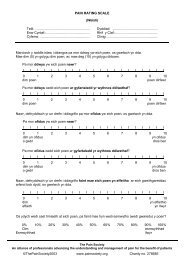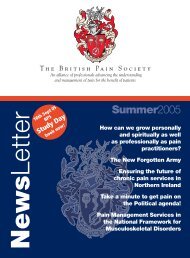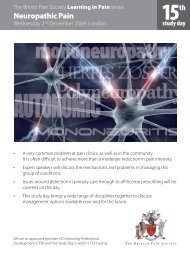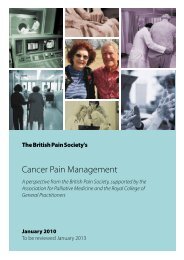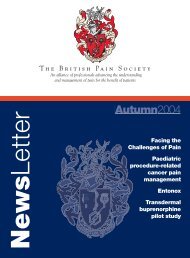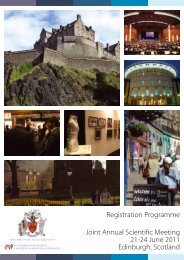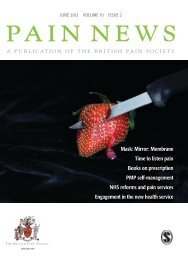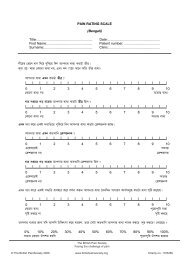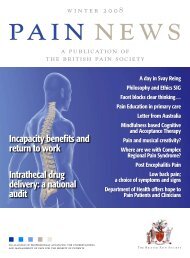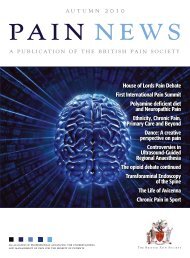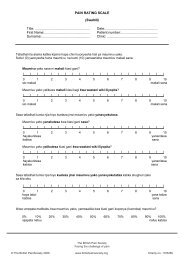Summer 2010 - The British Pain Society
Summer 2010 - The British Pain Society
Summer 2010 - The British Pain Society
Create successful ePaper yourself
Turn your PDF publications into a flip-book with our unique Google optimized e-Paper software.
the catastrophisation. Another<br />
interesting element is the<br />
consequences of physicians<br />
who are catastrophisers on the<br />
assessment of pain.<br />
On the second day of the<br />
conference we focused on areas<br />
allied to pain management<br />
programmes titled "Never<br />
on a <strong>Pain</strong> Management<br />
Programme"…<br />
Sexual problems and<br />
impotence<br />
This was commenced by<br />
consideration of psychosocial<br />
aspects of pain by Dr. Ian Eardley<br />
discussing male impotence<br />
and erectile dysfunction while<br />
Professor Kevan Wylie considered<br />
sexual dysfunction more broadly.<br />
Dr. Eardley discussed<br />
communication issues and the<br />
confusion which occurred in clients<br />
differentiating orgasm, desire,<br />
erection and ejaculation. Problems<br />
with ejaculation can be treated<br />
medically with high levels of success.<br />
Intra-penile devices and prosthesis<br />
are much more rarely required. Men<br />
who have psychological contributory<br />
factors to erectile function may have<br />
suggestive features. <strong>The</strong>se may<br />
include situational erection failure,<br />
the retention of early morning or<br />
masturbatory erections. Of relevance<br />
to us, selective serotonin reuptake<br />
inhibitors, tricyclic antidepressants<br />
and some anticonvulsants may lead<br />
to impotence as well as alcohol<br />
abuse and opioid abuse. Impotence<br />
is more common in obesity and<br />
it is also relevant that exercise<br />
is a protector. For me, the main<br />
messages were to be more proactive<br />
<strong>The</strong> <strong>British</strong> <strong>Pain</strong> <strong>Society</strong>’s<br />
<strong>Pain</strong> Management Programme Special Interest Group<br />
Clearing the fog…<br />
on the Tyne<br />
12 th National Conference<br />
on <strong>Pain</strong> Management Programme<br />
10 th & 11 th September 2009<br />
Northumbria University - Newcastle upon Tyne<br />
in screening for impotence and to<br />
realise that appropriate treatments<br />
are often very effective.<br />
Professor Wylie focused on female<br />
psychosexual issues and pain. He<br />
discussed the organic, psychogenic,<br />
relational and social factors which<br />
may impact on sexual function. We<br />
realise that psycho-sexual problems<br />
are common in patients attending<br />
pain management programmes.<br />
We should all be mindful of the<br />
problem, ask more frequently about<br />
sex and facilitate patients to talk<br />
and deal with the boundaries. <strong>Pain</strong><br />
management programme teams<br />
will have to decide how far along<br />
the ladder of care they wish to go.<br />
This care pathway may involve basic<br />
counselling, specific psycho-sexual<br />
work (body work including pelvic<br />
floor training and body awareness<br />
training), as well as behaviour and<br />
couple therapy. Because of the<br />
nature of some of these treatments,<br />
liaison with local psycho-sexual<br />
services will be important.<br />
At the end of these sessions I was<br />
left with a lingering memory that<br />
satisfaction with sex is highest in<br />
Nigeria and lowest in Japan (and<br />
perhaps surprisingly) France! Why?<br />
Unexplained pain, Chronic<br />
Fatigue syndrome, Irritable<br />
Bowel syndrome, Dorsal<br />
column stimulation<br />
Prevailing themes in Chronic<br />
Fatigue were explained by Mrs<br />
Sue Pemberton highlighting the<br />
considerable overlap and similarity<br />
between these conditions and<br />
chronic pain. In fact, the word<br />
pain could have replaced the<br />
word fatigue on some slides, since<br />
many aspects of assessment and<br />
management appeared similar.<br />
Vincent Dreary highlighted that<br />
patients with unexplained symptoms<br />
and pain are frequently labelled with<br />
prejudicial terms. A variety of other<br />
longstanding and allied psychological<br />
issues may coexist. Patients must<br />
be helped to make sense of the<br />
symptoms and assess their impact.<br />
CBT approaches were discussed<br />
including acceptance, commitment<br />
therapy and mindfulness.<br />
An excellent talk by Professor<br />
Peter Whorwell on irritable<br />
bowel syndrome (IBS) helped us<br />
understand this condition. Again<br />
there were many themes which<br />
made us feel we could be talking<br />
about patients with chronic pain.<br />
Most of the treatments used for IBS<br />
are focused on bowel management<br />
but one stood out, namely the<br />
evidence base for hypnosis in<br />
difficult cases.<br />
Peter Murphy talked about dorsal<br />
column stimulation and emphasised<br />
that the variability in outcome may<br />
result from various psychological<br />
factors. Historically patients waiting<br />
for major intervention such as dorsal<br />
column stimulation did not get onto<br />
a pain management programme.<br />
Patients can now attend pain<br />
management programmes either<br />
before dorsal column stimulation<br />
insertion or afterwards. Defining<br />
the priority of treatments cannot be<br />
grounded in strong evidence based<br />
medicine, but multi-disciplinary<br />
assessment and management plans<br />
remain pivotal.<br />
Medico legal cases<br />
An intriguing talk by Dr. Ian<br />
Yellowlees on medico-legal cases<br />
highlighted the current caution<br />
about placing patients on pain<br />
management programmes that<br />
had coexisting medico-legal cases.<br />
<strong>The</strong> central concern appeared to<br />
be that of financial disincentives to<br />
improve from a pain management<br />
programme. This view is currently<br />
not grounded on evidence. Wider<br />
studies in other interventions in<br />
patients with chronic pain provide<br />
mixed evidence that interventions<br />
are less effective with a medico-legal<br />
case ongoing. In charismatic style,<br />
Dr. Yellowlees made this a brief<br />
part of the talk because, though<br />
much was affirmed, little which was<br />
grounded in evidence. Dr. Yellowlees<br />
then switched to put the audience<br />
through the complexities of the legal<br />
process presenting a powerful view<br />
that rather than focusing on the<br />
issue of financial disincentives for<br />
improvement, the personal toll of<br />
legal cases on the individual should<br />
be the main consideration (e.g. pain<br />
behaviour, body vigilance and self<br />
worth to mention a few). He also<br />
made a few interesting observations<br />
about those businesses involved<br />
in the processing of medico legal<br />
complaints.<br />
<strong>Pain</strong> and addiction<br />
Dr. Freedman led a session on<br />
addiction and pain medication.<br />
Reducing and managing pain<br />
medicines are frequently a theme<br />
of pain management programmes<br />
and the time beyond. People with<br />
addiction problems have more pain<br />
problems statistically. In addition,<br />
many with pain can misuse<br />
medication and alcohol. Red flags<br />
for addiction such as prescription<br />
forgery, using non-prescribed<br />
medicines and even obtaining<br />
medicines from non medical sources<br />
represent extreme cases. While<br />
dependency can be defined as<br />
craving, continued and compulsive<br />
use (3c's), people can experience<br />
subtle problems with medicines<br />
and substances. Dr. Freedman<br />
recommended thinking very<br />
carefully about what the function of<br />
individual drugs were for patients.<br />
In summary, I hope some of these<br />
brief, highly selected, personal<br />
reflections are helpful to those that<br />
did not attend the conference or<br />
whose specialist interest lie in other<br />
areas and give an accurate flavour<br />
of the conference to those that<br />
did. Others may have taken away<br />
completely different key points of<br />
course!<br />
I would like to thank the University<br />
for hosting the conference, the<br />
members of the organisation<br />
committee and all the work which<br />
was done in the secretariat especially<br />
Ken Obbard.<br />
Finally, a lingering memory,<br />
for many was the Gateshead<br />
Millennium Bridge, the “winking eye<br />
bridge” which opened almost by a<br />
twist fate as we stood in front of it<br />
drinking wine at the Baltic Museum<br />
balcony. For those who like to plan<br />
well in advance, the next conference<br />
is in Bath in 2011.<br />
PAI PAI N N NNE E WS S S US PM RMI NE G R <strong>2010</strong><br />
57




